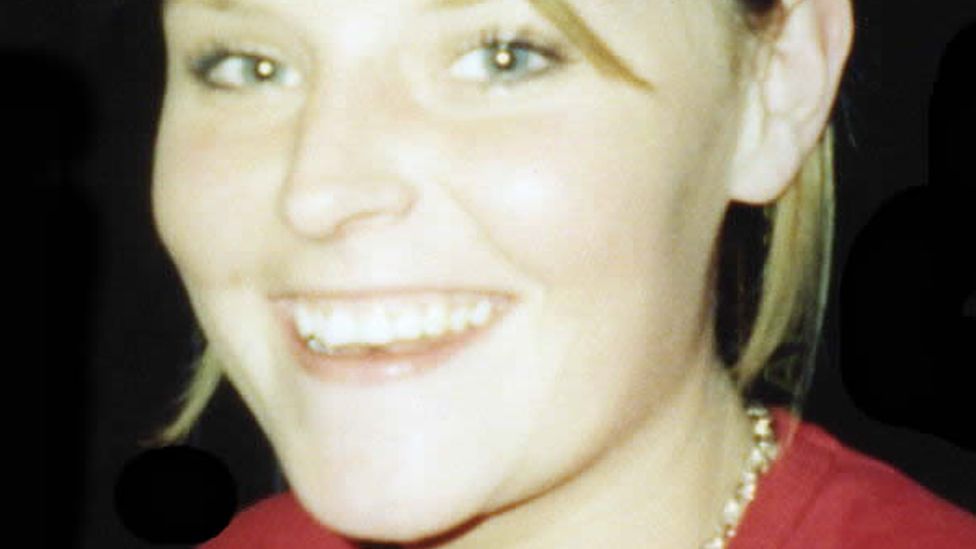
Lisa Dorrian, a 25-year-old shop assistant, went missing in February 2005
Scammers have used missing woman Lisa Dorrian to front fake reward money appeals on social media, her sister has said.
Joanne Dorrian warned that the fraudsters created fake profiles using Lisa’s likeness.
They then asked people to send money to a PayPal account they said contributed towards a rewards fund.
“It really sickened us as a family,” Joanne Dorrian told Radio 5 Live’s Stephen Nolan Show.
“I just really felt that level of scam sunk lower than low.”
Ms Dorrian disappeared in February 2005 after attending a party at a caravan park in Ballyhalbert, County Down.
It is presumed the Bangor woman was murdered – her body has never been found.
‘Preying on our vulnerability’
A £20,000 reward for information on her disappearance is being offered by the charity Crimestoppers, and the family has also raised thousands more, which it can distribute for the right information.
Most of these funds have come through online donations, but Joanne Dorrian said some scammers have taken advantage of the public’s generosity.
“We get thousands of views of people wanting to support us and coming forward, even anonymously, with information on things they have heard over the years,” she told the BBC’s Morning Live programme earlier this week.
“We had a massive fund-raising drive last year and we rose £65,000.”
Joanne Dorrian said scammers have been using her sister’s images and name to fraud people online
The money raised has been put toward a reward fund, but she said scammers spotted an opportunity to set up fake funds, using photographs from the real campaign to appear genuine.
The fraudsters asked people to send donations to a PayPal account, but Lisa Dorrian’s family only use GoFundMe, which is a specialist crowdfunding platform.
As the PayPal money transfers were sent as a “family and friends” transaction, they could not be recovered.
“Luckily we got it taken down very quickly but the potential there was for people to lose a lot of money to people that were really preying on our vulnerability and people’s kind nature,” Joanne Dorrian told Radio 5 Live’s Stephen Nolan Show. on Saturday.
She said these sort of scams are a warning for people to use social media very carefully “especially around missing people”.
“People are giving money very generously and hoping to help a certain cause, like Lisa’s missing persons, but unfortunately they were just playing into the hands of the scammers,” she said.
‘Sickened us as a family’
She added there needs to be a bigger emphasis on online scams centred on missing people.
“The world wide web is too large for the likes of the PSNI (Police Service of Northern Ireland) to trace one or two rogue payments, as they would see them, but it really does have the potential to cause a lot of serious harm.
“It’s horrible… when people prey on that just for financial gain,” she added.
Image source, Pacemaker
A billboard appeal for information on Lisa Dorrian’s disappearance
“It really sickened us as a family and we felt very sorry for the people who had donated money in good faith.”
Joanne Dorrian explained it was only due to the family having “an army behind them” that these rogue accounts were able to be identified and removed.
“This wasn’t an easy process,” she said.
“We have thousands of supporters who actually helped us to do that. Twitter was actually bombarded with reports of a fake account.”
She added: “To prey on the vulnerabilities of people who are absolutely consumed and tortured by the loss of their loved one, to me it’s an all-time low.”
Who do we know about Lisa Dorrian’s disappearance?
It is one of the most high-profile unsolved cases in Northern Ireland.
The last reported sighting of the 25-year-old was on the night of 27 February 2005.
When the shop assistant from Bangor, County Down, first went missing, police said they could not rule out a crime.
Image source, Joanne Dorrian
Lisa Dorrian (right), with her sisters Michelle and Joanne, has been missing for 18 years
The police response was upgraded from a missing person search to a murder inquiry on 13 March 2005, two weeks after she was last seen.
Over the past 16 years, police have followed thousands of lines of inquiry, taken hundreds of statements and carried out hundreds of unsuccessful searches.
They have also made several arrests but no-one has been charged with Lisa’s murder, and her body has never been found.








